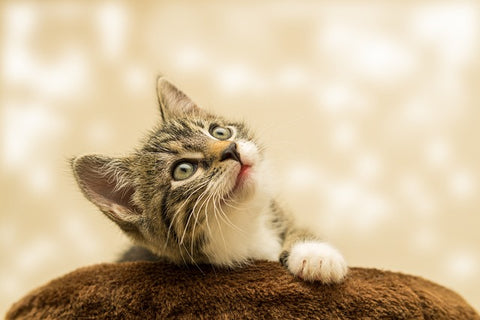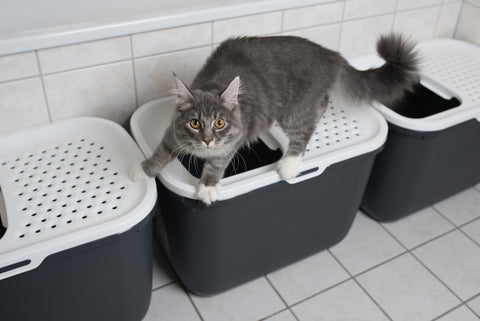How do I know if my cat is happy?

Cats make us happy. They may deposit half-dead rodents on the kitchen counter, leave poop on the pillow, attack our feet under the covers when we’re trying to sleep, and pointedly ignore us when we’re awake.
And yet, in some way that seems to defy explanation, cats make us gloriously happy.
But are they happy?
We cannot say to our cats, “Are you happy living here?” and expecct an answer. Cats express themselves physically, through body language and vocalizations.
And while they can't tell us directly, (“Why yes, Dawn. I am happy. And delighted you asked!”), they answer indirectly, through behavior, sounds, and gestures.
Fortunately, it does not take much to keep a cat happy. They require their basic needs to be met: good nutrition, clean water, an acceptable place to toilet, companionship, and play. But how do you know you’re doing all of those things right?
The good news is that your cat will tell you if he is happy or if he is not. You just need to know what to look and listen for.
Vocal cues can tell you if your cat is happy
My cat is purring. She must be very happy, right?
Maybe. Cats do purr in positive social situations. They purr when greeting other cats they know well. They purr when they nurse their kittens, or when they are kittens who are nursing. They purr when they’re feeling contented in warm, familiar surroundings. They purr when asking for food, when they’re grooming, relaxing, or feeling friendly.[1]
But, cats also purr in stressful situations. A cat who is hungry may purr. Injured, frightened cats, also purr. Cats may actually use the act of purring to soothe themselves in stressful situations.
In other words, the only way to know for sure why your cat is purring is in context. Observe your cat and try to notice exactly when he is purring, and then look for some of the other signs of happiness below to confirm your tentative conclusion.
(To learn more about purring, read this post.)
A cat's tail can tell you if she's happy
A cat’s tail is a kind of weathervane, letting you know which way the wind is blowing at any given moment.
Happy, confident cats hold their tails high in the air, usually with the little tip curved one way or the other. Behaviorists sometimes describe this tail position as the “questionmark position.”
But not all erect tails are a sign of confident happiness. An upright tail that is puffed out (like a bottlebrush), is the sign of a cat who is upset, not happy.
A happy cat may wave her tail softly and rhythmically, from side to side. But again, not all side-to-side motions speak of happiness. At cat who is thrashing, thumping, or swishing her tail may be planning an attack[2] and is NOT happy.
(Read more about cat tails in this post.)
Cats who play are happy
I love what Dr. Franklin McMillan, director of well-being studies at Best Friends Animal Society had to say to PetMd.com about play and cats:
“Scientists believe that play is a luxury behavior, only engaged in when all other higher priority needs are met.”[3]
In other words, only when everything else is right with a cat’s world are they free to play.
Cats who are playful are clearly in a good mood. A cat who has the energy to play is healthy; a cat who is feeling unwell or stressed would not want to engage with you in play.
Conversely, a cat who is not playful may also be a happy cat. How can the opposite of what I just said be true?
A contented cat is may not be in a playful mood, but is nonetheless contented. A contented cat may be calmly interested in his surroundings, or even not interested at all. The main thing is that a contented cat is relaxed, not alert or agitated.
A cat's eyes and ears can also show if she is happy
How do you know if your cat is relaxed and not agitated? The eyes and ears sometimes give it away.
Cats speak with all of their body parts and the eyes have a lot to say.
Direct eye contact is challenge or a threat. Dominant cats stare down a challenger; submissive cats look away.[4]
Half-closed eyes are a sign of trust. Closing the eyes says, “my guard is down.” Blinking can be a kind of eye closing. A blinking cat is feeling relaxed and trusting.[5]
Feel free to blink back.
Read this post for more information on slow-blinking.
A cat with ears pointing up and forward (just slightly) is feeling either contented or playful.[6] But watch the precise angle of those ears! Ears pointing straight up is a sign of alertness, not contentedness or playfulness.
It's awfully subtle, isn't it?
Fortunately, all of the other ear positions are clear as day. Ears turned sideways or backwards, or laying flat against the head may mean a whole host of other things, but cats with sideways, backwards, or flat ears are most definitely not happy.
(Read more about ear position in this post.)
A cat who grooms (but not too much) is a happy cat
Grooming is one of those bellwether signs. Cats are fastidious creatures who love to keep their coats in tip-top shape. A cat who grooms every day, out in the open where you can see her doing it, is feeling healthy, happy, and well-adjusted. A well-groomed coat is a sign that all is well.
Cats may skip their regular grooming habits if they feel unwell or unhappy. Worse, they can take it too far in the other direction and over-groom. Keep an eye out for excessive licking, biting, or hair loss, which can indicate stress or a physical problem.[7]
(But too much grooming is a problem, too. Read this post to learn more about overgrooming in cats.)
A healthy appetite is a sign of a happy cat
A finicky cat makes for great cat-food commercials, but in real life, most healthy, happy cats eat.
(Read this post on finicky cats.)
Refusing to eat is a serious problem for cats, perhaps even more so than for other creatures. When a cat stops eating, her body must rely on fat reserves. But she needs protein to process that fat.
A cat who stops eating, quickly uses all of her protein reserves and her liver becomes overwhelmed by fat, which in turn can lead to liver failure.[8] Read about it in this post on hepatic lipidosis.
A healthy appetite is a sign that your cat is feeling fine. Loss of appetite often indicates that your cat is sick, and this requires immediate veterinary attention.
There are other factors, besides illness, than can cause a cat to stop eating. Once you’ve eliminated all possible physical causes for anorexia (the science-y word for loss of appetite), consider psychological factors.
Stress can also cause a cat to lose interest in her meals. Have there been any changes in your cat’s life or routine?
A stressed cat is not a happy cat.
A cat who is using the litter box properly is a happy cat

I’m not from the South, but I like this bit of southern wisdom: “If momma ain’t happy, no one’s gonna be happy.”
The same is true of cats. If your cat isn’t happy with the toileting arrangement in your house, no one is going to be happy.
Cats require a clean litter box that is to their liking. Period.
It doesn’t matter that you’d like the litter box to be in the garage. Or if you bought a fancy litter box with the entrance on top from a Facebook ad. Your cat doesn’t care that you like the scent of lavender, or that it’s easier to get a particular kind of crystal litter in the mail.
And your cat wants a clean litter box. Not to your standard of clean, but to his. Anyone out there have a cat that jumps into the box the minute you put fresh litter in? THAT clean.
Dr. Nicolas Dodman, famed veterinarian and animal behaviorist, reported that about 50% of all cat behavioral referrals have to do with “improper elimination.” And cats who fail to use the litter box once a week are four times more likely to be given up.[9]
There are too many reasons to explain litter box fails for this blog post, but suffice it to say that a cat who is not using the litter box the way it was intended is not happy.
Read these posts on peeing, pooping, and litter boxes for more information:
How to keep litter box odor under control
How many litter boxes do I need?
How to litter train your new kitten
Why is my cat peeing on my bed?
Why doesn't my cat cover or bury her poop?
Conclusion
It is true that cats do not communicate with us in the way we communicate with others of our kind. But they do talk to us. And if we care about their happiness, all we have to do is listen.
If you enjoyed this post, you might also like,
How do I know if my cat loves me?
Love Pinterest? Here's a Pinterest-friendly pin for your boards!

Dawn LaFontaine is a lifelong animal lover who always seems to have a little pet hair in her keyboard. Her blog, Kitty Contemplations, helps cat guardians better understand and care for the special beings they share their lives and homes with. Her cat-products business, Cat in the Box, sells beautiful, well-made, and award-winning products that she designed to meet the biological needs of cats.
_______________
FOOTNOTES
[1] Venton, Danielle. “Why Do Cats Purr? It's Not Just Because They're Happy.” Wired, Conde Nast, 15 Jan. 2018, www.wired.com/2015/05/why-do-cats-purr/.
[2] Geddes, Jennifer Kelly. “7 Signs You Have A Happy Cat.” Pet Central by Chewy, 20 Mar. 2018, petcentral.chewy.com/7-signs-of-a-happy-cat/.
[3] Sullivan, M. (2017, July 6). 15 Signs Your Cat Is Happy. https://www.petmd.com/cat/slideshows/15-signs-your-cat-happy
[4] Meaning of Cats' Eyes: Facts About Cat Eyes: Michelson Found Animals. (n.d.). https://www.foundanimals.org/eyes-know-cat-thinking/
[5] Gould, Wendy Rose. “12 Telltale Signs Your Cat Is Happy.” Reader's Digest, Reader's Digest, 22 Nov. 2019, www.rd.com/list/happy-cat-signs/.
[6] Cat Talk: A Guide to Cat Body Language. (2016, December 09). https://www.petfinder.com/cats/bringing-a-cat-home/how-to-read-cats-body-language/
[7] Sandia Animal Clinic. “Why Cats Stop Grooming Themselves.” Sandia Animal Clinic, 14 Feb. 2024, www.sandiaanimalclinic.com/2019/11/01/why-cats-stop-grooming-themselves/.
[8] Flowers, A. (2019, November 07). Cat Not Eating Causes and Treatments. https://pets.webmd.com/cats/guide/my-cat-wont-eat
[9] Dodman, N., BVMS, Dipl. ACVB. (2012, May 29). Stop Feline Inappropriate Elimination. https://www.veterinarypracticenews.com/stop-feline-inappropriate-elimination/


4 comments
love this!!!